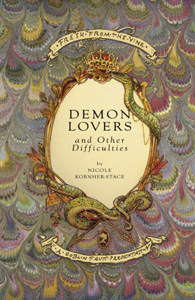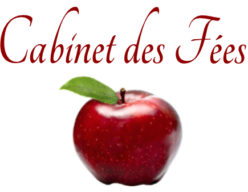Demon Lovers & Other Difficulties
By Nicole Kornher-Stace, 2009
Reviewed by Mike Allen
(originally published here)
 Demon Lovers & Other Difficulties by Nicole Kornher-Stace is the first print venture from the creators of Goblin Fruit, a venue I’ve never gotten tired of promoting. Nicole is new to me, but I didn’t realize how new she was to poetry until I read the interview with her in the new issue of Goblin Fruit and learned that she made her first poetry sale back in October (to GF, of course.)
Demon Lovers & Other Difficulties by Nicole Kornher-Stace is the first print venture from the creators of Goblin Fruit, a venue I’ve never gotten tired of promoting. Nicole is new to me, but I didn’t realize how new she was to poetry until I read the interview with her in the new issue of Goblin Fruit and learned that she made her first poetry sale back in October (to GF, of course.)
In speculative poetry, there seem to be two basic types of poets; those who gradually evolve a voice over the course of years and those who step out of the gate appearing to be already fully formed in terms of what their approach is going to be. I would put Sonya Taaffe and Catherynne Valente in this latter category, and Nicole, to me, seems to fit that billing.
How would I characterize that style; well, like Sonya and Cat, her writing emphasizes folklore and rich, dense language. Her writing is … I grope for words in trying to categorize poetic style … pricklier, more angular than that of those other ladies, not the thickly-layered sheen of words you find in one of Sonya’s pieces, nor the seductive siren flow of Cat’s work. Nicole’s work is more staccato, more aggressive.
A sample, from “This is Not a Love Story”:
(You will know him from his voice like a crossroads
and his eyes of blue, brown, hazel, green
You will know him from his heart like an owl pellet
spiked with eyeteeth, wristbones, maidenheads
You will know him from his smell like gallows new-built
like trespass, like wrack, like homecoming)
There’s only five poems in her chapbook, but as most are lengthy I don’t think any reader will feel cheated. Quite the opposite, as each poem is packed with several poem’s worth of concept and image. They deal with myth and magic, the topics you’d expect from a self-respecting issue of GF, and they’re dark and even violent in tone, but shot through with an impish sense of humor. In a couple of instances, I felt like her language got the better of her, or perhaps of me, that I had to really wrestle with a poem or a portion of a poem to make sure I understood it. I suspect the more fairy tale lore you know, the more transparent the poems will be.
But that’s okay, as each culminates to quite satisfying effect. The chapbook begins with “The Demon Lover’s Child Grows Up,” which can be read in its entirely here, but is broken up into its four parts throughout the book. The fascinating premise, that a demon has been born to a witch remembering its previous life but, in child form, is helpless to do much about what it knows, is played for both humor and horror. I found the poem’s turning point in part three difficult to unravel but definitely appreciated the ending’s ironic note.
The sonnet “Janet Stands Her Ground Before the Queen” sounds another wry and ironic note at the climactic moment of the tale of Tam Lin and the Queen of Elfland. (Familiarity with the tale will assist in fully comprehending who speaks and why.) “This is Not a Love Story” involves a scolding and an imparting of wisdoms from an old woman to a dreamy young girl trying half-heartedly to tangle with powers and life strands she doesn’t fully understand; it’s a rich piece that within a repeating structure yields startling new images line by line.
My favorite was “The Changeling Always Wins,” perhaps the most accessible of the poems, an inversion of “The Demon Lover’s Child Grows Up” that manages, as the most fun speculative poems often do, to mesh the subject at hand with another layer that sparks both recognition and verisimilitude. The deft two-step of the final two lines is simply delightful. I would wager that if this poem were nominated for the Rhysling Award next year it would be a strong contender.
The final poem, unique to the collection, is a collaboration between Nicole and C.S.E. Cooney called “Other Difficulties,” in which two creatures who once belonged to a witch correspond about their lives after her death. It’s a macabre funhouse confection that left me with a warm and evil grin.
I should mention that aside from being full of beautiful and challenging work, the chapbook itself is a beautiful object, thanks to the efforts of the captive artist at GF, Oliver Hunter. I recommend the book both for the sake of sampling Nicole’s poetry framed in a well-planned out presentation and for the sake of encouraging the GF crew to make more.
By the way, this chapbook actually comes with a teaser trailer (I’ve always admired the way the Goblin Queens make use of the latest tech to support their time-honored subject matter) and here it is:

